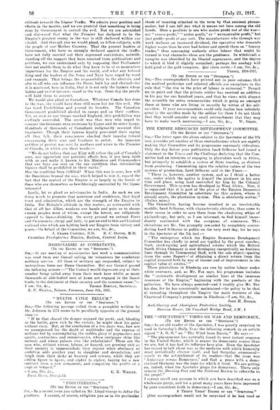THE EMPIRE RESOURCES DEVELOPMENT COMMITTEE. [To THE Horrors or flue
"Seecrense."1
SI11,—The letter upon the above subject in the Spectator of the 7th inst. provides yet another of those contradictions which are rapidly making that Committee and its programme supremely ridiculous. Only the day before your publication Lord Selborne had issued a statement in the Times and the Challenge declaring that the Com- mittee had DO intention of engaging in plantation work in Africa, but primarily to establish a system of State trading, as distinct from producing. Commenting upon the relative values of the two systems of production, Lord Selborne said in the Times:— "There is, however, another system, and as I think a better one, under which the native is himself the producer in his awn time and place, using land controlled for him by the Colonial Government. Tints system has developed in West Africa. Now, it is suggested that it is part of the plan of the Empire Resources Development. Committee to substitute for this system, where it already exists, the plantation system. This is absotutely untrue." (Italics mine.) The Committee, having beeeme involved in an inextricable muddle, Lord Selborne, with characteristic chivalry, thus came to their rescue in order to save them from the chastening whips of philanthropy, but only, so I ate ieformed, to find himself imme- diately confronted with the scorpions of 'commerce. This chivalrous act Mr. Pox promptly rewarded by completely contra- dicting Lord Seaborne in public on the very next day, for ire says in the Spec-tutor of the 7th inst :— " The enterprises which the Empire Resources Development Committee has chiefly in mind are typified by the great ranches; fruit, stock-raising and agriceltnral estates which the British South Africa Company is now developing energetically on business lines through its Commercial Staff, with the role olieeet—qtsotiug from the same Repart—` of obtaining a direct return from tire capitol invested both by way of income and of improvement in the capitah value of estates.'" These plantations in Rhodesia are run by native labour under white overseers, and, as Mr. Pox says, his programme includes the "systematic development on similar lines of the immense resources of the Empire," beginning with the products of the palm-tree. We have always asserted—and 1 readily give Mr. Pox his due, for be has coneiste,ntly maintained-ethe policy to be that of extending throughout the Empire the main features of the Chartered Company's programme in Rhodesia.—I am, Sir, be., JOHN H. BARBIE. Anti-Slneery and Aborigines Protection Society,
Denison Douse, 736 Vauxhall Bridge Rood, S.W. 1


























 Previous page
Previous page